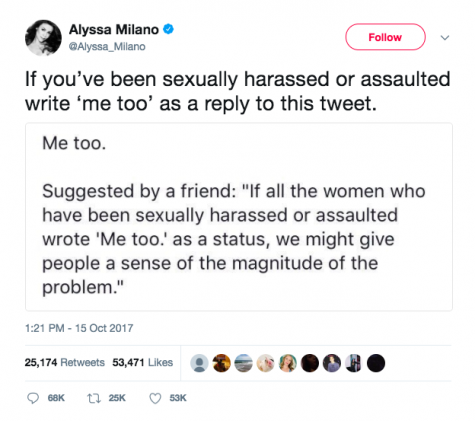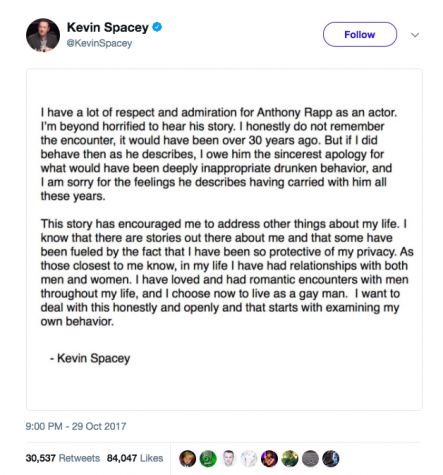#MeToo movement places sexual assault in the spotlight
On Oct. 5, a single New York Times article threw the film industry in turmoil. Quiet yet strong, sharp yet blunt, the piece revealed that film producer Harvey Weinstein, one of Hollywood’s most powerful, had sexually harassed numerous women over the course of his lengthy and successful career.
In the days after the allegations, over 70 women have come forward to share their experiences with Weinstein, who they alleged had made inappropriate sexual advances during casting calls or business meetings. In light of these accusations, Weinstein’s fall from grace was swift — big names and big companies alike denounced his actions, and prestigious film organizations such as the Producers Guild of America have expelled him from their ranks.
“As of now, Harvey Weinstein being kicked out of the academy has been the only type of accountability that he’s had,” said Chardonnay Madkins, the project manager for sexual assault advocacy nonprofit End Rape on Campus (EROC). “People’s protections being revoked and taken away—that’s one important thing coming from this conversation. It’s just a centimeter, and we need to move a foot, but we’re gaining a little bit of traction. We just need to push further.”
On a larger scale, the allegations against him have propelled sexual assault into the limelight, prompting numerous men and women to share their own experiences and, moreover, to make their own open accusations. And for the past few weeks, one hashtag dominated social media platforms: #MeToo.
Created by social activist Tarana Burke and popularized by actress Alyssa Milano in the aftermath of the allegations of sexual misconduct against Weinstein, #MeToo has a simple message: that sexual assault and abuse are widespread, despite a general taboo that surrounds the topic.
Milano first suggested the hashtag in a tweet on Oct. 15, ten days after the allegations against Weinstein had surfaced, when she asked women to use the hashtag to indicate whether they had ever been sexually assaulted. The response was instantaneous. By the next day, over 500,000 people had used the hashtag on Twitter, while millions more had posted with it on Facebook.
The hashtag quickly expanded, opening up conversation on a topic that has often gone unaddressed as a societal taboo. Shortly after senior Jenna Sadhu helped to open the Women’s Health Discussion, the upper school’s platform for women to speak about their experiences with sex, along with biology teacher Dr. Kate Schafer and psychology teacher Kelly Horan, she discovered the #MeToo hashtag and decided to post with it.
“I never would have done it if the movement hadn’t started. I didn’t want to go, ‘This is my story. Everybody pay attention,’” Jenna said. “I kept it really brief — my tweet just said #MeToo and an emoji. And I still think it was really powerful even though I didn’t put any words with it because the movement itself is extremely powerful.”
At the same time, some users have also raised concerns about the possible unintentional damage that asking survivors to share their stories could do. For instance, some pointed out that reading about accounts of sexual assault could be upsetting to survivors and trigger anxiety or post-traumatic stress disorder (PTSD). Likewise, others worry that it inordinately glorifies speaking up about sexual misconduct while shunning those who do not feel comfortable sharing their own experiences.
Despite these concerns, for many men and women, #MeToo has become a way to bring other instances of misconduct to light. For social justice organizations such as EROC that strive to provide safe environments for victims of sexual assault, #MeToo’s openness is an asset to conversations about sexual assault.
“I think this dialogue points to the cultural change that needs to happen so that we can inform policies and things like that,” Madkins said. “I think that what’s so important in the work of social justice is general is the cultural change aspect, because you can’t possibly [do things like] end rape on campus without that cultural change.”
Accusations have quickly mounted, leading to the ousting of several actors, such as House of Cards lead actor Kevin Spacey, who was accused of sexual harassment and assault by numerous men in the industry. In response, Netflix has suspended House of Cards indefinitely and opted to not release his movie Gore. Likewise, producer Ridley Scott has removed him from his upcoming biographical film All the Money in the World and replaced him with actor Christopher Plummer, who will reshoot all of Spacey’s scenes in preparation for the film’s December release.
In the political realm, Alabama’s Republican senate candidate Roy Moore has been accused of making inappropriate advances to multiple women when they were teenagers. Though Moore continues to deny the allegations, several prominent members of the Republican Party, including Speaker of the House Paul Ryan, have spoken out against Moore and called for him to withdraw from the race.
The movement has become international as well. In the aftermath of the allegations against Weinstein, a similar flood of accusations directed towards members of the British parliament appeared through #MeToo, prompting Secretary of State Michael Fallon to resign and causing Prime Minister Theresa May to create new protocol for reporting sexual abuse concerning political leaders in Great Britain.
Though #MeToo has both offered an outlet for sexual assault victims and shed light on numerous cases of misconduct, some of them decades old, the question of how much change will be enacted still stands.
“In the cases that we’ve been hearing about in the media, none of the people have been actually convicted of any particular crimes. But things that have been brought to light have had huge impacts on the careers [of people in the entertainment industry],” said biology teacher and Women’s Health Discussion advisor Dr. Kate Schafer. “However, the impact on people in politics remains to be seen, but for the most part, it doesn’t seem to have such an effect on their careers.”
In the days following the original allegations, hundreds of thousands of people have used this hashtag to express sympathy for victims of sexual assault and to further expose decades of sexual assault accounts that have gone unsaid. Supporters of #MeToo took the movement to the streets of Hollywood and Highland on Sunday to march in solidarity with those who have experienced sexual assault.
#MeToo has also spawned other social media movements, such as #MeAt14. Primarily a response to the allegations concerning Moore, the hashtag asks women to share pictures of their 14-year-old selves to show that teenagers cannot be expected to consent to sex with adults.
While #MeToo has been primarily spearheaded by women, men have responded to it through #HowIWillChange, a hashtag in which men pledged to support victims of sexual assault and to raise awareness for it.
Along with the initial allegations against Weinstein, #MeToo has prompted a new outpouring of victims’ voices in the conversations surrounding sexual assault and harassment. And as new accusations surface every day, this topic shows no sign of returning to the sidelines of society.
“I have, on a personal level, just been so awed by the courage shown by so many people who have come forward and said #MeToo and even shared their personal experiences. I have a number of friends who have shared incredibly harrowing and difficult stories, and I think that it has been quite staggering to hear and witness the bravery of so many people,” Dr. Schafer said. “It’s amazing that finally, some conversations are being had that needed to happen for a long time.”
Katherine Zhang (12) is the co-editor-in-chief of the Winged Post, and this is her fourth year on staff. Kat most enjoys seeing the paper come together...


















![“[Building nerf blasters] became this outlet of creativity for me that hasn't been matched by anything else. The process [of] making a build complete to your desire is such a painstakingly difficult process, but I've had to learn from [the skills needed from] soldering to proper painting. There's so many different options for everything, if you think about it, it exists. The best part is [that] if it doesn't exist, you can build it yourself," Ishaan Parate said.](https://harkeraquila.com/wp-content/uploads/2022/08/DSC_8149-900x604.jpg)




![“When I came into high school, I was ready to be a follower. But DECA was a game changer for me. It helped me overcome my fear of public speaking, and it's played such a major role in who I've become today. To be able to successfully lead a chapter of 150 students, an officer team and be one of the upperclassmen I once really admired is something I'm [really] proud of,” Anvitha Tummala ('21) said.](https://harkeraquila.com/wp-content/uploads/2021/07/Screen-Shot-2021-07-25-at-9.50.05-AM-900x594.png)







![“I think getting up in the morning and having a sense of purpose [is exciting]. I think without a certain amount of drive, life is kind of obsolete and mundane, and I think having that every single day is what makes each day unique and kind of makes life exciting,” Neymika Jain (12) said.](https://harkeraquila.com/wp-content/uploads/2017/06/Screen-Shot-2017-06-03-at-4.54.16-PM.png)








![“My slogan is ‘slow feet, don’t eat, and I’m hungry.’ You need to run fast to get where you are–you aren't going to get those championships if you aren't fast,” Angel Cervantes (12) said. “I want to do well in school on my tests and in track and win championships for my team. I live by that, [and] I can do that anywhere: in the classroom or on the field.”](https://harkeraquila.com/wp-content/uploads/2018/06/DSC5146-900x601.jpg)
![“[Volleyball has] taught me how to fall correctly, and another thing it taught is that you don’t have to be the best at something to be good at it. If you just hit the ball in a smart way, then it still scores points and you’re good at it. You could be a background player and still make a much bigger impact on the team than you would think,” Anya Gert (’20) said.](https://harkeraquila.com/wp-content/uploads/2020/06/AnnaGert_JinTuan_HoHPhotoEdited-600x900.jpeg)

![“I'm not nearly there yet, but [my confidence has] definitely been getting better since I was pretty shy and timid coming into Harker my freshman year. I know that there's a lot of people that are really confident in what they do, and I really admire them. Everyone's so driven and that has really pushed me to kind of try to find my own place in high school and be more confident,” Alyssa Huang (’20) said.](https://harkeraquila.com/wp-content/uploads/2020/06/AlyssaHuang_EmilyChen_HoHPhoto-900x749.jpeg)




